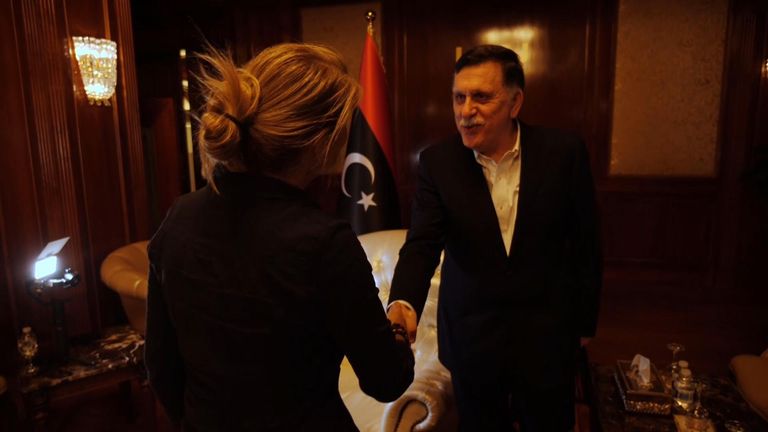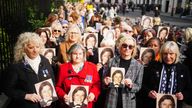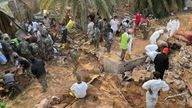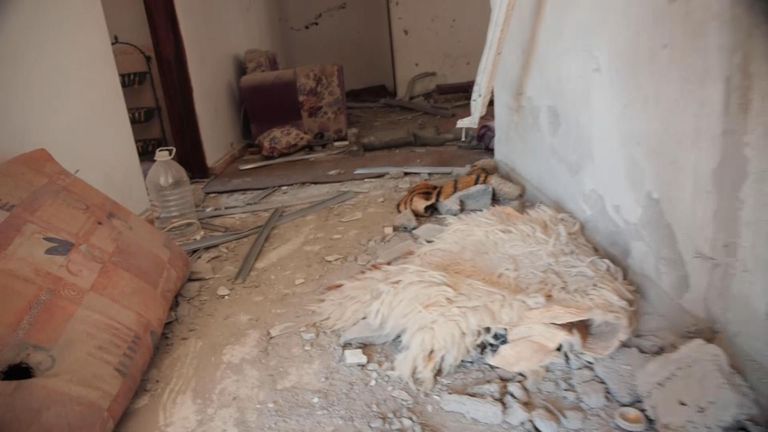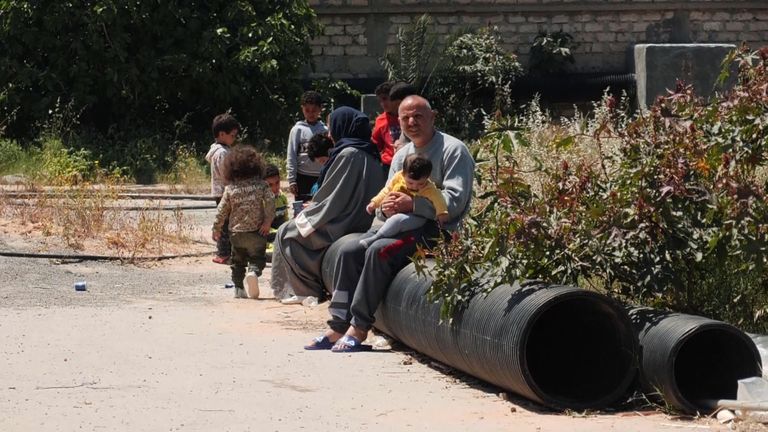Libya: UN-backed PM says 800,000 migrants could reach Europe amid instability
He is pressuring the international community to help his forces stop an advance by a rival administration, causing chaos in Libya.
Tuesday 16 April 2019 06:46, UK
Libya's United Nations-backed prime minister has told Sky News that there could be an influx of more than 800,000 migrants from his country into Europe if the instability in his country continues.
Fayez al Sarraj, a trained architect who entered politics in his 50s, is a man with a tough message and he's not mincing his words right now.
We're sitting in a meeting room inside the prime minister's office in the capital - about seven miles (12km) away from the battlefronts raging on the edge of the city.
Fighters loyal to him are trying to stop an advancing self-styled army commanded by a warlord who was a General under the country's former dictator, Colonel Gaddafi.
It is his first interview since Khalifa Heftar declared he was going to clear the capital of "terrorists" less than a fortnight ago.
The two men were meant to be sitting down talking peace right now in negotiations facilitated by the United Nations.
Instead there's frantic fighting on the perimeter of the city and thousands of civilians have fled their homes to escape the battling.
The prime minister runs the government in Tripoli, the authority in the west of Libya, which is recognised by the United Nations - while General Heftar has set up a rival administration in the east from his base in Benghazi.
The idea of peace negotiations now seems very far off the mark.
"We still want peace," Prime Minister Fayyaz al Serraj told us. "But if we are forced to fight, we are up for the fight.
Talking about sitting around a negotiating table before the retreat of these aggressive forces, I think is not appropriate.
"The international community must pressurise these forces and call it by its name and pressurise them to go back to where they came from," he says.
He chooses his words carefully.
The International Criminal Court has been gathering evidence of possible war crimes being committed on the capital by General Heftar's men.
There has been attacks on schools, homes and offices - hit by rockets and bombs apparently dropped by the Heftar forces.
The General has declared he's clearing the capital of "terrorists".
The prime minister claims this is a thinly-disguised military grab of power.
"Has Tripoli all of a sudden become a terrorist city?" he asks.
The UN secretary general was in the capital meeting him only about 12 days ago.
"And are all its residents now terrorists? Are Abu Salim residents who were bombed yesterday now terrorists? Or those living in Ain Zara, or Sawani? Are all of these terrorists? Or are these crimes against humanity? Isn't it time now to call it as it is?"
He wants the fighters who are carrying out the attacks to be tried for crimes against humanity and for Khalifer Heftar to be held accountable.
Putting more pressure on the international community, the leader warned about a European migrant crisis.
"What's going to happen with this security breakdown is that 800,000 illegal migrants on Libyan ground will have to leave Libya and will cross the sea towards Europe," he said.
"Amongst these 800,000 there are terrorists and criminals. This will be disastrous".
He also won't rule out getting military help from outside.
I ask him what he wants the international community to do.
He replies: "We speak about a political intervention. But when we see civilians targeted in their houses, hospital and schools - our electricity being cut because of destruction to our infrastructure - I think all means are possible for us to get the help of one of the parties to stop this assault."
I press him three times on whether he means military help.
And three times he replies: "We hope it doesn't reach that level, but the protection of civilians is a top priority."
Civilians we've spoken to have spoken angrily about how they believe the West let Libya down after their intervention during the Arab Spring revolt which led to the toppling of their former leader, Colonel Muamar Gaddafi.
The country has been in turmoil ever since.
"Yes, this is true. This is what happened in 2011," the Libyan prime minister says. "The world has abandoned Libya and left it to suffer on its own and a lot of things have become complicated. And I fear that's what's happening will happen again and the world will abandon Libya again and it will go into another dark tunnel.
"Some are trying to portray this conflict as one between east and west; trying to recruit the tribal loyalty of some to this conflict but this is not true.
"Whats happening now is a conflict between who wants a civilian democratic state with an army which is under the control of a political authority - and who wants a military rule and a totalitarian ruling."

